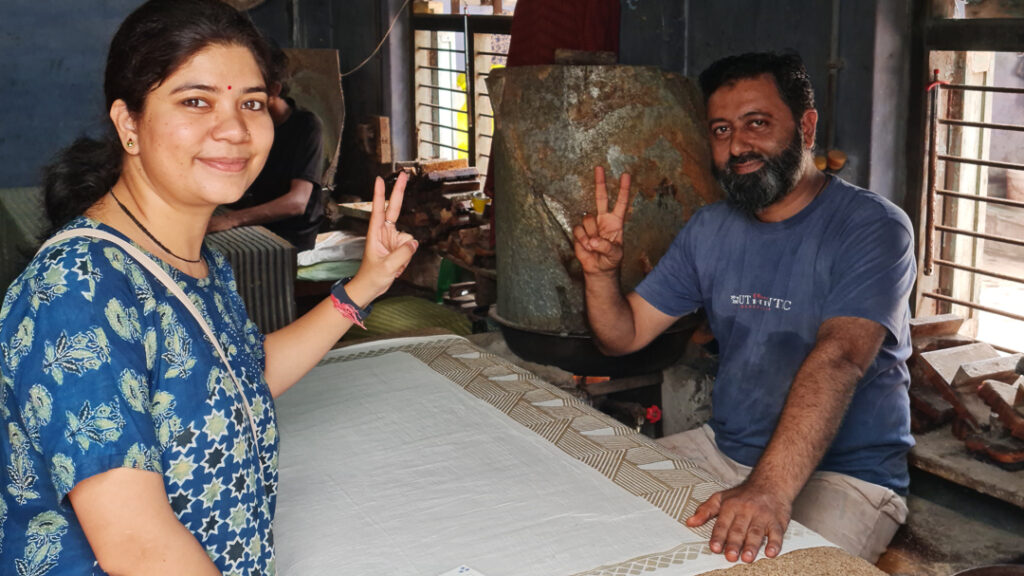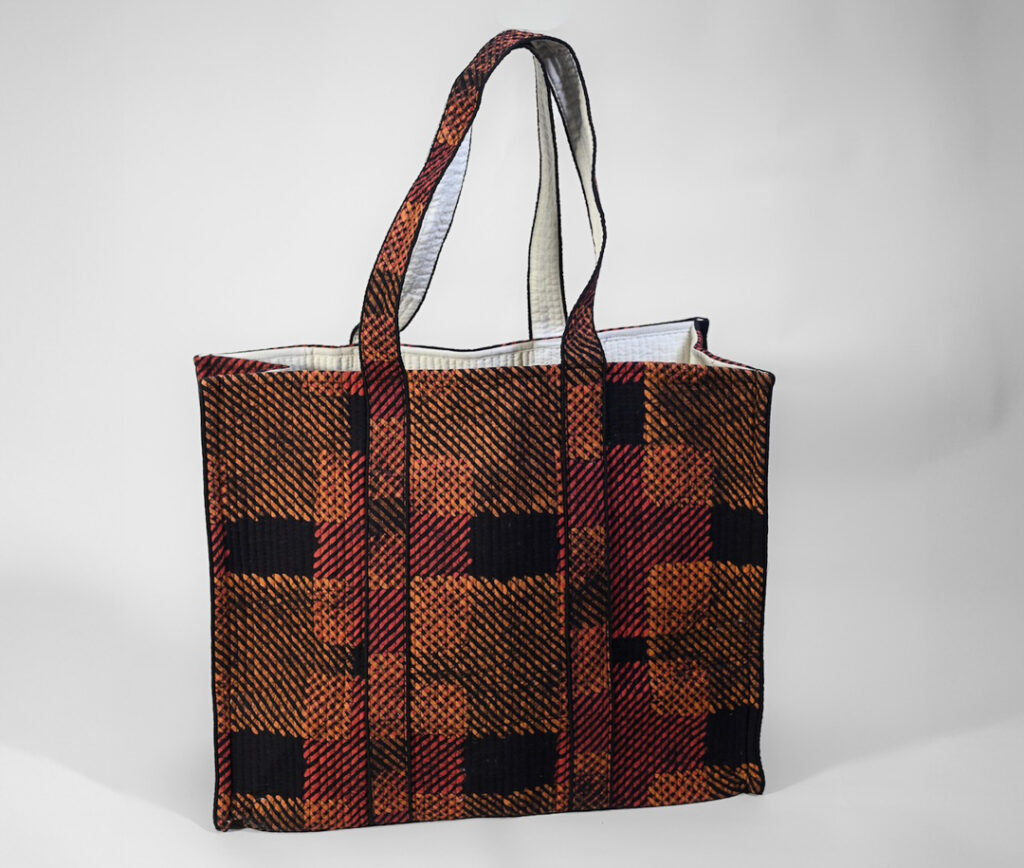
Khushbu Mathur writes about her successful collaboration with block printer Shakil Ahmed
I moved to Kutch in August 2022 along with my startup Bowstring Handmade. Just after settling here, I got an opportunity to teach at Somaiya Kala Vidhyalaya, an institution providing design inputs to the artisans of Kutch. I enjoyed interacting and thinking together with the young talented minds who came from three craft communities’ handloom weaving (extra-weft), Ajrakh hand block printing and Bandhani.
In my teaching lessons, I tried to introduce the concept of customer experience, branding and presentation to the students that they want to build through their brand. Also, a thought process must be maintained when selecting products for the events and exhibitions they participate in. All of them loved defining a message that they wanted to convey through their brand and a USP of their brand.
The course was completed but I returned home with many questions in my head:
- What is my exact role as a craft designer/craft manager?
- How can I collaborate with these talented young minds?
- Where is the gap? How can my startup collaborate and work together with the artisan designers?
- How big is the potential market for them?
- How can my startup help them to explore the immense possibilities?
With the buzz in my head, I started meeting the artisan designers here to learn and understand the supply chain of their crafts.
First I met Shakil Ahmed, an artisan designer and master craftsperson specialising in naturally dyed batik handblock printing based in Mundra. He took me around his workshop. It is an old building that belongs to his father and two of his uncles. In the very first small room adjacent to the entrance, they keep the grey materials. After entering the workshop, the room on the right was the printing room which had four printing tables. Next to it was their office where they kept their ready stock as well. Next to it they had dyeing area. Opposite to that they had open wash area. Only the boiling area was covered with the shed.
The entire chain of work is in beautiful flow. I was amazed to see the incredible collection of wooden blocks ideated by his grandparents, father and him. They are working with three types of dyes Natural, azo-free vat dyes and napthol. They are mainly using paraffin wax in the printing process because it can easily be reused. But he has also explored soy wax and beeswax. The kind of natural colours he has developed of silk, cotton and linen were very captivating to me.
They are making yardages, stoles, duppattas and sarees. He shared his experience of Kala Raksha (the artisan designer programme was initiated at Kala Raksha by Judy Frater). He was pushed by one of his uncles to appear for this course and he said that it ended up as a life-changing experience for him. The course helped him in many ways. He knew colours before but after learning colour theory he started enjoying it more. He loved to draw before to design blocks, but after learning about design principles, he started visualizing the compositions differently, He loves exploring textures. I think I had nearly spent around 4-5 hours looking at his work. I bought a natural indigo saree and two natural dyed fabrics from him from a very limited collection.
His knowledge about his craft is immense. The major problems I could find out are:
- Because he is too involved with the operations of his printing business he wanted to explore his ideas more but he couldn’t.
- He is printing materials for many designers as a job worker as per their brief but he is compromising his identity as a designer as well as the margins.
- He has a brand “Neel Batik” but he is not able to promote it. He couldn’t visualize it as a brand.
- He never thought of doing made-ups for his brand.
- He has done a lot of explorations in natural dyes but produced a very limited collection as he couldn’t find genuine buyers for it.
- He is compromising the value of all the hard work he did in the past 15+ years that should be now calculated in the profit of his business because he thinks that if the price goes up then his customers won’t buy from him.
- When it comes to exploring something new in the technique his excitement is different but when it comes to selling he undervalues his skill and products.
- He and his family deserve to live a high quality life but they only think about basic living.
The humble and honest nature of this sector has always pushed me to work for them on the ground level.
My initial proposal to Shakil bhai was to design and develop a few sellable products out of the surplus fabrics or the dead stock that they can sell as a ready-to-use range. My startup will support in development of the products and will bear the cost of the development.
As it was our very first collaboration and he was keen to work on the garment, I suggested that he go for kaftans (short and long), tote bags and toiletry kits. I showed him some patterns and he liked the idea. He said because it is our new beginning together we should use fresh good quality fabric. With very good energy, we started our project. Together we have selected the blocks and the textures. I gave him space to finalize the prints and the colours following the current trends. I was always available at the workshop when the work of our project was on. We did a collection of eight prints for 16 Kaftans (short and long), three prints for bags and toiletry kits in azo-free dyes and later five long Kaftans in natural dyes. I got it stitched in Jaipur maintaining the export quality and then we did the photoshoot and catalogue. All the products were labelled with the Neel Batik tag. Together we developed a very transparent and fair pricing system that benefited both of us. The entire project was taken as a pilot by my startup and the funds were also taken care of.
In the second round, we did a collection of bathrobes, men’s shirts and dresses only in natural dyes. In Mumbai, bathrobes and mulmul dresses were sold like hotcakes in one of the exclusive exhibitions on Handblock Batik Crafts of Kutch by Khamir where Shakil Bhai participated. I was also associated with the project by Khamir as a design consultant. That selling experience was one of the milestones for Shakil Bhai and he got confidence about the product we developed, the value we deliver and the price he is quoting. It gave a boost to his entire family involved in the business.
For my startup, his confidence in his product and the value he is creating was the biggest win of the year 2023.
We commit together to go long and celebrate more wins. We want to mainly focus on natural dyes and scale it up as much as we can.
This year Shakil Bhai’s new workspace is under construction so his team is shifted to another space. The space is very limited so they could just manage their ongoing orders from resellers. We are expecting it to be ready by the last month of this year.

Follow @bowstringhandmade/ and for product inquiries, email bowstringhandmade@gmail.com





Comments
This is very inspiring. Our society has many many skilled people who under value their skills, are unable to create according to their full potential cause of various reasons. People like Khusbu is what many many of us need to uplift our confidence. Congratulations Bowstring and Shakeel Bhai.
Wonderful to read of the Sahjeevan experience. Just the kind of practical optimism we need!